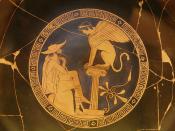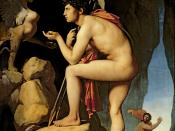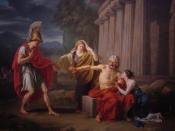The tragic tale of ÃÂOedipus the KingÃÂ is a multifaceted one with numerous themes. The most prominent of these themes, though, is that of man versus nature because, no matter what they did, none of the characters could escape their destiny, as determined by the gods. King Laius could not escape his fate, Oedipus could not escape his prophecy and even Jocasta fell victim to her destiny. The fate of these three characters greatly supports this theme.
ÃÂApollo said my child was doomed to kill [King Laius]; and my childÃÂPoor baby!ÃÂit was my child that died first.ÃÂ (Sophocles 233) Here, Jocasta explains the prophecy given to King Laius, as well as what the king and queen did in an attempt to offset the prophecy. They sent their child, Oedipus, to be left on a mountain to die. It is quite clear that the result of this action points to the theme of man versus nature, as their attempts to destroy the child back fired and, in a bizarre turn of events, Oedipus returned to Thebes to unknowingly fulfill the prophecy.
Despite his efforts, King Laius could not escape his fate.
ÃÂThey prophesied that I should kill Polybus, kill my own father; but he is dead and buried and I am hereÃÂI never touched him, neverÃÂ ÃÂ (Sophocles 240) The once grand king, Oedipus, could no more escape the words of his prophecy than could his father. Without knowing it, by trying to outmaneuver the prophecy told to him, Oedipus actually played right into the hands of fate. No matter what course of action he chose, poor Oedipus would have still found the same tragic outcome. In this play, fate is an insurmountable force.
ÃÂFor GodÃÂs love, let us have no more questioning! Is your life nothing to you?ÃÂ (Sophocles 244) As she desperately exclaims this to Oedipus, Jocasta had figured out the ghastly truth of her husbandÃÂs origins. She had figured out that Oedipus was her son and the fulfiller of the prophecy and she was deathly afraid that Oedipus would bring the truth to light. She did all she could to smother the truth, but, in the end, the truth revealed itself and caused the horrible chain of events that followed. Nothing Jocasta could do would bury her fate, as the gods designed it.
ÃÂOedipus RexÃÂ is certainly a vivid depiction of the theme of man versus nature. Despite all of the grand effort put forth, King Laius was doomed to his fate, Oedipus had mysteriously and unknowingly fulfilled his prophecy and Jocasta could not evade her appalling future. All of these characters were puppets to the hand of fate.
Works Cited:Sophocles. ÃÂThe Three Theban PlaysÃÂ Trans. Robert FaglesNew York: Penguin Books, 1986





